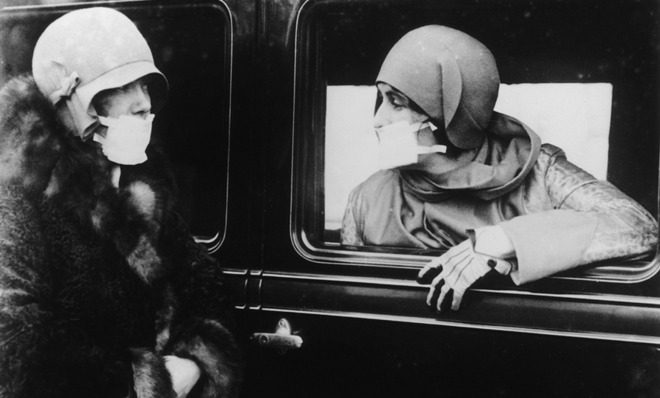Masturbation was once considered more offensive than child abuse
The frightening ways Victorians dealt with "the solitary vice"


A free daily email with the biggest news stories of the day – and the best features from TheWeek.com
You are now subscribed
Your newsletter sign-up was successful
I've written many articles based on Victorian/Edwardian advice books. There was advice for everything, from how to improve your breast size to keeping your man faithful, all written with earnest authority by "experts" of the day. In these old books, I noticed that one subject appeared over and over, usually shrouded with dire euphemisms: The Solitary Vice. Self Abuse. The Vicious Habit.
In other words: Masturbation.
Past generations were absolutely terrified by masturbation, and regarded it among the vilest of sexual practices. Some considered it more of an offense, as we will see, than child molestation. Health experts of the day demanded it be curbed, especially in children, often by any means necessary. That is why, unlike the other articles in my Advice series, a retrospective on masturbation cannot be funny. It can only be heartbreaking.
The Week
Escape your echo chamber. Get the facts behind the news, plus analysis from multiple perspectives.

Sign up for The Week's Free Newsletters
From our morning news briefing to a weekly Good News Newsletter, get the best of The Week delivered directly to your inbox.
From our morning news briefing to a weekly Good News Newsletter, get the best of The Week delivered directly to your inbox.
Reasons to fear masturbation
Nearly all writers of these anti-masturbation screeds referred to the state of the soul, and how masturbation slowly shreds it, defiling God-given organs of regeneration by using them for selfish gratification. The sinfulness of masturbation can still be debated, but the medical and psychological maladies these writers claimed resulted from the practice have mostly been disproved.
Joseph William Howe, who wrote Excessive Venery, Masturbation and Continence in 1884, gave bizarrely specific details as to the physical affects masturbation had on a woman's genitalia, believing that the practice deformed the organs. He wrote, for example, "I have seen cases in the hospital where [the labia minora] resembled the ear of a small spaniel."
According to Mary Ries Melendy, author of 1903's Perfect Womanhood for Maidens—Wives—Mothers:
A free daily email with the biggest news stories of the day – and the best features from TheWeek.com
If the sexual organs are handled it brings too much blood to these parts, and this produces a diseased condition; it also causes disease in other organs of the body, because they are left with a less amount of blood than they ought to have. The sexual organs, too, are very closely connected with the spine and the brain by means of the nerves, and if they are handled, or if you keep thinking about them, these nerves get excited and become exhausted, and this makes the back ache, the brain heavy and the whole body weak. It lays the foundation for consumption, paralysis, and heart disease. It weakens the memory, makes a boy careless, negligent and listless. It even makes many lose their minds; others, when grown, commit suicide. [Melendy]
Masturbation steals the blood from the rest of your body, leaving you undernourished and sickly. If you even think too much about your sexual organs, the nerves inside them become exhausted and give you a backache. This is the first step on the road to eventual suicide.
Howe also has a list of surprising, often fatal medical conditions that result from self-abuse.
DISEASES THAT RESULT FROM SEXUAL EXCESS AND MASTURBATION.
Cerebral anemia
Significance of loss of memory
Local paralysis
Hemorrhage in the cerebellum
Sclerosis of nerve fibers of cerebellum
Concussion of the spinal cord
Softening of spinal cord
Impotence from sun-stroke [Excessive Venery, Masturbation and Continence]
And let us not forget the most horrific disease that a female masturbator may bring on herself. Especially if she's blonde.
Nymphomania is apt to occur between the ages of 16 and 25. Blondes are more frequently subject to it than brunettes. It is characterized by an uncontrollable appetite for lascivious pleasures, exhibited (in its worst forms) in public and private, without regard to time, place, or surroundings….The only cure for the affection is marriage, or amputation of the clitoris. [Excessive Venery, Masturbation and Continence]

(Getty Images)
Treatment for masturbation
Amputation of the clitoris was debated even during the heyday of hysteria, but many doctors considered it legitimate treatment for a female who masturbated. Usually a physician's advice was less drastic, at least at first.
William Josephus Robinson wrote A Practical Treatise on the Causes, Symptoms, and Treatment of Sexual Impotence and Other Sexual Disorders in Men and Women in 1913. His prescription for restraining a child's desire to masturbate starts blandly enough, and quickly proceeds to abusive.
First, there is a proper way to sleep.
The child, boy or girl, should sleep alone on a rather hard mattress. The covering should be light. A coverlet may be put over the feet. The child should always sleep with the arms, not under, but on the cover or blanket. [A Practical Treatise]
Robinson believed this was seldom enough to stop the vice. Beating was recommended, as children were not smart enough to understand other methods of communication. However, never spank the masturbating child. They may enjoy it.
I believe that with children, to whom reasoning and moral suasion make no appeal, physical punishment is the only alternative and is morally fully justifiable. Only there must be no spanking, for spanking has a distinctly sexually exciting effect on many children. [A Practical Treatise]
Severe cases call for restricting the child, creating special garments, and binding their hands and feet to secure them to the bedposts of their beds.
The masturbating child's arms should be put in long sleeves, which should be so pinned or tied, that the child's hands could not reach the genitals. In some cases, it is also necessary to put on long drawers, buttoning in back, and spread the legs apart attaching them to the bedclothes or the bedpost, so that one thigh cannot be rubbed against the other. There are also specially made appliances of metal, made differently for male and female children, which are put on over the genitals, and protect them so that the child cannot handle them (see illustrations). [A Practical Treatise]
Robinson then elevates the treatment of masturbation from abusive, to sadistic. A sure way to discourage a child from touching their genitals is to mutilate them.
In two or three cases I have found it necessary to apply rapidly a red hot wire to the child's genitals, to the prepuce in a boy, to the labia majora in a little girl. Whether because it was too painful to handle the parts, or because the shock of the application made a strong impression, or whether it was the fear of a repetition of the same treatment, but this little rather brutal procedure proved effective: The child ceased to masturbate. [A Practical Treatise]
Dr. John Harvey Kellogg (brother of the cereal king), a highly respected director of the famous Battle Creek Sanitarium, also resorted to mutilation in "obstinate" cases, this time in little girls. In his Ladies Guide in Health and Disease, he wrote:
In obstinate cases, very severe means must be sometimes adopted. We were once obliged after every other measure had failed, to perform a surgical operation before we were able to break the habit in the case of a young girl of 8 or 10 years who had become addicted to the vice to a most extraordinary degree. [Ladies Guide in Health and Disease]
Molestation and masturbation
If you can imagine it, there is even a deeper level of despair to be uncovered in these old texts. The doctors who assumed a child's masturbation was the root of all her health and psychological problems had no interest in investigating other causes.
Below are some of the signs Kellogg listed to help parents discern whether or not their daughter had discovered the life-wrecking sin of masturbation. Beware of:
A sudden, marked decline in health...
When a girl who has formerly been truthful, happy, obliging, gentle, and confiding, becomes within a short period of time peevish, irritable, morose, disobedient, and restrained in her manner.
Unnatural boldness in a little girl who has been previously been retiring and reserved...
A forward or loose manner in company with little boys is suspicious conduct, especially in one who has previously shown no disposition of this sort...
The presence of leucorrhoea [discharge] in a young girl accompanied by a relaxed condition of the vagina is presumptive evidence of the existence of this vice, if there is no other cause to which this unnatural condition can be attributed...
The blank, dull, lustreless, expressionless eye, surrounded by a dark ring, habitually given to staring into vacancy, frequently tells the tale of sin which its possessor vainly imagines to be unknown to any but herself. [Ladies Guide in Health and Disease]
If some of these descriptions sound uncomfortably familiar to you, there is a reason. Compare them to some of the conditions listed today by the U.S. Department of Health and Human Services as signs of sexual abuse in children:
- Pain, itching, bruises, bleeding, or discharges in the genital, vaginal, or anal areas;
- Compulsive interest in sexual activities;
- Exceptional secrecy;
- Being overly compliant or withdrawn;
- In-depth or unusual sexual knowledge or behavior with peers that is developmentally inappropriate;
- Masturbation. [ChildWelfare.gov]
Have you ever wondered if we have more sexual abuse in our culture now than in the past? Were people less terrible in the old days, or just less likely to talk about what had been done to them? The attitudes toward sexuality put forth in these old texts go a long way toward answering that question.
Kellogg relates a horrible story made all the more unbearable by hindsight.
In a case which came under our observation a few years ago a little girl, naturally bright and unusually attractive and intelligent, had become the victim of this soul-and-body-destroying habit, which had brought on a serious nervous disease that threatened to destroy both body and mind before she had reached the age of 10 years. Her first instruction was received from a hoary-headed fiend in human shape who had enticed her to a secluded place, and there introduced her to all the nastiness which his depraved and sensual nature could devise. [Ladies Guide in Health and Disease]
Please note the real tragedy in Kellogg's story. It's not that the child was molested. It's that the molestation introduced "this soul-and-body-destroying habit" of masturbation, the act of which he blamed all the child's subsequent maladies on. So the child bore not only the pain of the original abuse, but the shame and disapproval of her parents and doctor.
What's more, Kellogg asserts that the child will never again be whole. They are corrupted, and will forevermore have "evil tendencies."
A child whose mind has been contaminated by evil communications may be rescued, but cannot be restored to the innocence which when once lost is gone forever. A scar will always remain which cannot be effaced. Our observation has been that the cases of vicious depravity in young women are almost exclusively confined to those whose minds have been corrupted in early childhood so that their evil tendencies have grown and strengthened with their years. [Ladies Guide in Health and Disease]
Sexual awareness was considered a corruption. Exploring your own body could lead to a beating. Being molested and speaking up about it could cause a whole town to view you as "ruined," and might even lead to further sexual abuse under the care of your doctor. It is only relatively recently that Western attitudes toward sexuality — a thing we desire and detest at the same time — has relaxed. People lament the degradation of our society, the sexualization of our culture. As reasonable as those complaints may be, it is important to remember that those changes helped create a society that can talk about sex without shame and blame. And that, in turn, helped take many of these brutal practices and ideas out of our society and lock them safely away in the history books.
Therese O'Neill lives in Oregon and writes for The Atlantic, Mental Floss, Jezebel, and more. She is the author of New York Times bestseller Unmentionable: The Victorian Ladies Guide to Sex, Marriage and Manners. Meet her at writerthereseoneill.com.
-
 Switzerland could vote to cap its population
Switzerland could vote to cap its populationUnder the Radar Swiss People’s Party proposes referendum on radical anti-immigration measure to limit residents to 10 million
-
 Political cartoons for February 15
Political cartoons for February 15Cartoons Sunday's political cartoons include political ventriloquism, Europe in the middle, and more
-
 The broken water companies failing England and Wales
The broken water companies failing England and WalesExplainer With rising bills, deteriorating river health and a lack of investment, regulators face an uphill battle to stabilise the industry
